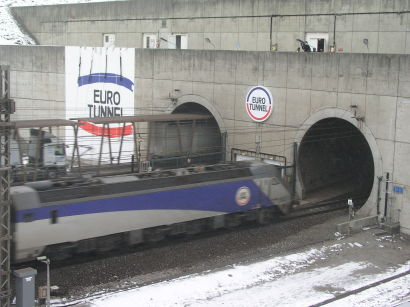CHANNEL TUNNEL charges are too high and are discouraging the growth of traffic, according to the European Commission.
Eurotunnel maintains its charges are 'transparent and not excessive', but the British and French governments have been given two months to take action or else a court could make a ruling, with the possibility of daily fines. The new moves to enforce the rules covering Tunnel access and costs have been welcomed by the Rail Freight Group.
The European Commission has estimated that 43 per cent of the Tunnel's capacity is unused, and says that the scale of charges has meant that some freight is diverted to lorries, adding to the number of road journeys on both sides of the Channel.
The high charges are also said to be inflating Eurostar fares. Currently the company is reported to be paying a fixed charge of 4,320 euros for each train which passes through the Tunnel, plus a toll of 16.60 euros for each passenger on board. This means that a fully loaded Eurostar triggers a track usage charge of about 17,000 euros, or just over 22 euros for each passenger.
The European Commission says the charges are roughly twice as high as they should be, because under European law Eurotunnel is only entitled to levy a charge which is 'consistent' with the costs of track wear and train regulation.
As things stand, the Commission believes that Eurotunnel is using the extra revenue to effectively subsidise its own Shuttle services.
It is understood that Eurotunnel had sought an exception in a bid to help pay for construction costs, although an investigation had not found evidence to support this claim. In fact, costs had dropped significantly after the company's debt had been restructured six years ago.
European Commission vice-President Siim Kallas said: "'The Channel Tunnel is not being used to its full capacity because of these excessive charges. As a result, more freight is being carried on lorries instead of by rail, freight operators and their customers are being over-charged, and passenger are paying over the odds for their tickets. The current regime is also stifling growth in the rail sector."
Eurotunnel responded that it has 'always sought the development of cross-Channel traffic and concentrates significant resources on this goal'.
The Commission also had some sharp words for the Tunnel's own regulator, the Anglo-French Intergovernmental Commission, which it dubbed as 'weak' and far from independent, saying: "Lack of independence of a rail regulator can lead to failure by the regulator to address complaints by operators in an independent manner or to adopt decisions to force compliance with EU rules and thus can lead to distortions of competition".
A Department for Transport spokesman responded: "It is not accepted that the UK has failed to implement the relevant EU rules regarding the Channel Tunnel, or that the IGC is not independent".
In a related dispute, the Commission's regulators say that an agreement which reserves 50 per cent of train paths for SNCF and Deutsche Bahn violates EU rules because its 65-year term is too long.
Rail Freight Group chairman Tony Berkeley said: "We are pleased that the European Commission is taking forward these infringement proceedings against the two governments for their failure to introduce a structure fully compliant with European legislation, to which they signed up ten years ago.
‘In addition, the two governments should do all they can to remove other barriers to service growth, in particular new charges imposed by French Government owned operator SNCF or RFF for ‘security’ checks, and ensure that all operators get fair and equal access to the network in France."
He added: "The potential for railfreight growth through the Tunnel is huge, but it needs a concerted effort by both governments, regulators and others to make it happen."


